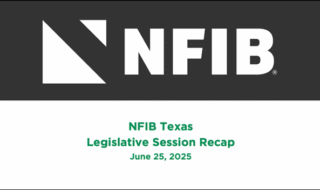May 7, 2021 Last Edit: June 5, 2025
NFIB Oregon Rallying Members to Act on Two Bills
State Director Anthony Smith reports from Salem on the small-business agenda for the legislative and political week ending May 7. (This story has been updated for the May 20 newsletter. Please note Take Action request)
It’s Day 109 of the 160-day Oregon Legislative Session and the last two weeks have proven to be quite a roller coaster ride for small businesses across the state. At one point, businesses in 15 counties were forced to limit their operations or shutter their doors. A week later, they were allowed to reopen – and hopefully stay open, with an “end of June” timeline in play for a potential end to all business restrictions due to COVID-19.
Here are the quick highlights of what’s been going on, and what’s coming up, with more information below on each topic:
- Another (Temporary) Shutdown: Businesses in 15 counties were ordered to further restrict their activities after a surge of COVID-19 cases caused hospitalizations to spike. The governor reversed course on this just four days later, announcing that no counties would remain in the Extreme Risk category beyond May 6.
- Unemployment Insurance Tax Relief Scheduled for Public Hearing: House Bill 3389 passed unanimously in the House on April 15. It will be heard by the Senate Committee on Labor and Business on Tuesday, May 11.
- Presumption of Retaliation: Guilty until proven innocent? That’s the thinking behind Senate Bill 483, which would shift the burden of proof on employers to demonstrate that they did not discriminate against an employee that files a complaint with Oregon OSHA.
- May 18 Update–Please click here to take action on this bill. It’s vital that you do.
Another (Temporary) Shutdown
On Friday, April 23, Gov. Kate Brown warned that a dozen or more Oregon counties could be returning to the Extreme Risk category of the state’s risk level framework if COVID-19 hospitalizations continued to increase. Four days later, Gov. Brown followed through with this threat and announced that businesses in specific industry sectors in 15 counties would be required to severely limit their operations, or in some cases, shut down completely.
SALEM, Ore., April 27, 2021—From Anthony Smith, Oregon state director for NFIB, the state’s largest small-business association, on Gov. Kate Brown’s announcement today, moving 15 of the state’s 36 counties back into the “Extreme Risk” category starting Friday, April 30.
“Public health officials continue to identify informal social gatherings as a primary driver of the recent uptick in COVID-19 cases, but these new restrictions are once again targeting businesses, even those businesses that have done everything asked of them to keep their employees and customers safe.
“This approach may be effective in grabbing headlines and thereby raising public awareness that the state’s authority to fight the virus hasn’t ended yet, but it does so by unfairly punishing the small-business owners, and their employees, who have already been most severely impacted by the negative economic effects of the pandemic.
“For many Oregonians, another shutdown order, regardless of how long it lasts, will be yet another pandemic-related inconvenience that may or may not prompt a change in behavior.
“For those whose livelihoods depend on these businesses being open, this news is completely devastating, especially now – more than a year into the pandemic and with an end to restrictions on business activity now in sight.”
During a press conference on April 23, Gov Kate. Brown stated that she is planning to “lift most restrictions and fully reopen our economy no later than the end of June.”
NFIB’s opposition to the governor’s decision received significant media attention: Bloomberg, KMTR 16, The Chronicle, Klamath Basin News, KMED-AM 1400, Central Oregonian, Oregon Catalyst, Oregon Business Report, KQEN-AM 1240, KPNW-AM 1120.
By Tuesday, May 4, it looked like several other counties were heading toward the Extreme Risk category, but with hospitalizations stabilizing across the state, the governor surprised everyone by announcing that all counties with case counts in excess of 200 per 100,000 (the metric that triggers Extreme Risk status) would return to High Risk starting today, May 7 – and that no county should have to return to Extreme Risk for the remainder of the COVID-19 public health emergency.
Unemployment Insurance Tax Relief Scheduled for Public Hearing
Just a quick update on this very important legislation – HB 3389 was originally scheduled for a public hearing in the Senate Committee on Labor and Business on May 4, but the committee’s agenda that day was very full, so the bill has been rescheduled for Tuesday, May 11.
As a reminder, the bill will provide $2.4 billion in UI tax relief to Oregon employers over the next decade by providing short- and long-term solutions to what would otherwise be an automatic payroll tax increase to replenish the state’s Unemployment Insurance trust fund.
NFIB is planning to testify in support of HB 3389 during the public hearing, and hopefully, the bill will move quickly to the Senate floor for a final vote. After that, the bill will be sent to the desk of Gov. Kate Brown for her signature.
Even though HB 3389 looks like it has the momentum to pass in the Senate, we aren’t taking any chances. If you haven’t done so already, please consider taking action now and asking your state senator to prioritize the passage of HB 3389 right away. We’ve refreshed the action alert on this issue, so even if you’ve already written your senator, please consider doing so again!
Presumption of Retaliation
After passing in the Senate on a strictly party-line vote of 18-12, SB 483 was heard by the House Committee on Rules on May 6. NFIB and several other business groups testified in opposition to this very misguided bill.
With complaints to Oregon’s Occupational Safety and Health Administration (OSHA) at an all-time high due to the ongoing pandemic, organized labor and plaintiff’s attorneys are seeking to make it easier for employees to sue their current or former employers.
The bill establishes a presumption of retaliation when an employer takes any sort of adverse employment action against an employee if that employee has filed a complaint with OSHA within 60 days (retaliation is already illegal, but the employee must provide evidence of the alleged retaliation). Employment actions subject to the presumption would include terminations, but also any situation where the employee thinks they have been retaliated against after filing a complaint. Hours cut? New supervisor they don’t get along with? Reassignment to new job duties? All of these situations could prompt a lawsuit – and with a presumption of retaliation in place, it would be the employer’s responsibility to prove that they did not break the law. It’s a “guilty until proven innocent” approach that runs contrary to how our system of justice is supposed to work.
Here is a transcript of NFIB’s testimony.
Chair Smith-Warner, Vice-Chairs Drazan & Holvey, and Members of the Committee:
For the record, my name is Anthony Smith, Oregon state director for the National Federation of Independent Business, representing thousands of small businesses across the state, many being the smallest of small businesses, with about 90% of our members in Oregon having fewer than 25 employees and 70% having fewer than 10 employees.
Madame Chair and committee members, I appear before you today in opposition to Senate Bill 483, a bill that would shift the burden of proof on employers to demonstrate that they did not discriminate against an employee that files a complaint with Oregon OSHA.
Under current law, employers are already prohibited from retaliating or discriminating against an employee for making an OSHA complaint. Employees can file a complaint – and regardless of whether an actual violation of workplace health and safety laws has occurred, an ”employee or prospective employee alleging to have been barred or discharged from employment or otherwise discriminated against in compensation, or in terms, conditions or privileges of employment” is entitled to register a complaint with the Bureau of Labor and Industries, or bring civil action against the employer, for an alleged violation of Oregon’s anti-discrimination and retaliation statute.
Because courts have established a link between the timing of complaints being filed and disciplinary action, employees need only provide a minimal amount of evidence to demonstrate retaliation, but they must at least present some evidence. SB 483 would eliminate that requirement by creating a presumption of wrongdoing on the part of the employer whenever an employee files an OSHA complaint, even if the employee is already on a corrective action plan – and even if the complaint was filed confidentially with OSHA, making it impossible for the employer to know which employee filed the complaint.
Employers may end up prevailing in these cases, but they will still be left with sizable legal bills, an especially daunting prospect for small businesses already struggling financially under current economic conditions.
For these reasons, NFIB respectfully asks the committee to oppose SB 483.
The House Committee on Rules has scheduled SB 483 for a work session Thursday, May 20. Please click here to take action. It’s vital that you do. Bills must be passed out of policy committees by May 28, except for the Rules Committee, which is not subject to the deadline.
Previous Reports and Related News
- April 27—Reaction to Latest Shutdown Order
NFIB is a member-driven organization advocating on behalf of small and independent businesses nationwide.
Related Articles















